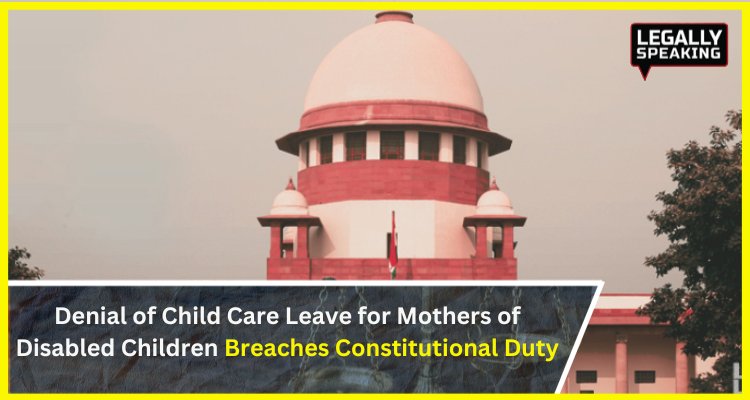
The Court noted that the refusal of child care leave to mothers would contravene the Constitutional obligation to guarantee equitable treatment of women in employment. The Supreme Court instructed the Himachal Pradesh government to review its policies regarding Child Care Leave (CCL) for mothers, aligning them with the provisions of the Rights of Persons with Disabilities Act, particularly concerning mothers raising children with special needs.
During the hearing of a petition brought by an Assistant Professor in the Department of Geography in Nalagarh, Himachal Pradesh, a panel consisting of Chief Justice of India DY Chandrachud and Justice JB Pardiwala observed that she had utilized all her available leave entitlements due to her son’s genetic disorder, for which he has undergone multiple surgeries since his birth.
The Court, in dealing with this matter, held that they believe that “this petition raises a serious matter of concern. The petitioner has raised the Rights of Persons with Disabilities Act. The commissioner has indicated on affidavit that no policy of CCL has been formulated. Participation of women in the workforce is not a matter of privilege but a constitutional requirement and the State as a model employer cannot be oblivious of this,” the Court observed.
“This may compel a mother to leave the workforce, and it applies even more to a mother who has a child with special needs. Ultimately, the plea does entrench in areas of policy, and areas of state policy must be synchronous with constitutional safeguards,” the order stated.
The Court then directed the Himachal Pradesh state government to amend its Child Care Leave (CCL) policy to align with the stipulations outlined in the Rights of Persons with Disabilities Act of 2016. The Court mandated the formation of a committee tasked with implementing these reforms. The committee, to be assembled by the State’s Chief Secretary, will comprise the State Commissioner under the Rights of Persons with Disability Act, as well as the Secretaries of the Department of Women and Child Development and the Social Welfare Department.
This directive from the Court marks a significant step forward in ensuring gender equality and empowerment, particularly for women balancing caregiving responsibilities with professional commitments. By requiring the Himachal Pradesh government to revise its policies in line with the Rights of Persons with Disabilities Act and constituting a committee for implementation, the legal system demonstrates its commitment to upholding the rights of women in the workforce, especially those facing unique challenges due to caregiving responsibilities. This decision not only affirms the importance of inclusivity and accessibility but also reinforces the judiciary’s role in fostering a more equitable and supportive environment for women in society.




